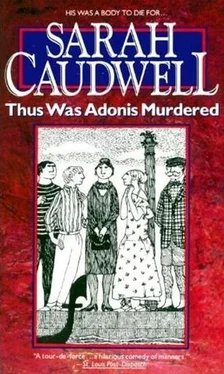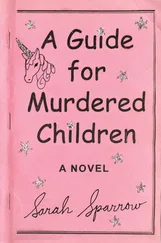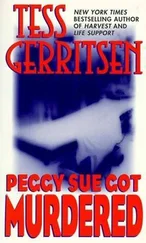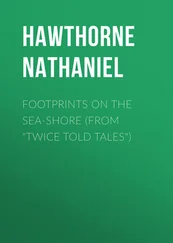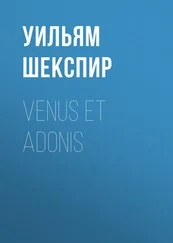In spite of his delicate appearance, he must have been quite athletic. With only a few yards’ start he reached the fourth floor, the top floor of the Palazzo, a flight and a half ahead of the policemen.
There is a window on the landing: he leapt for the sill and pushed the shutters open. He stood there, suddenly golden in the sunlight: I saw for a moment what Julia meant about Praxiteles and Michelangelo; and the two policemen — sensible, solid men, no doubt, with wives and families — the two policemen were checked in their pursuit.
“Oh no,” he said, smiling down at us, “no, I don’t think so, thank you.” And turned and jumped.
“The canal,” said one of the policemen, turning to run back. “He’s escaping by the canal.”
“No,” said his colleague, “not the canal.” Getting his bearings more quickly than the other, he had realized that that window did not face on to a canal, but on to a stone-flagged campiello: it is thus a surer escape than by water from the hands of any police force.
When I eventually managed to give the Vice-Quaestor some kind of explanation, he got in touch, of course, with the police in London, to ask them to go and talk to Kenneth Dunfermline. By the time they got there, though, it was too late — he had stabbed himself through the heart.
I remain, in spite of all this,
Your affectionate pupil, Timothy.
PS. The Vice-Quaestor has received by telex from London copies of three letters found beside Dunfermline’s body, the last in his own handwriting, and never posted. These he has kindly made available to me, and I enclose them. Also a copy of a telegram found here at the Palazzo, lying on the table beside the telephone.
Villa Niobe Paphos.
Republic of Cyprus.
20th August.
Dear Kenneth,
I can’t tell you how pleased I am you can come to Venice. Not just because of having you to cast an expert eye over Aunt Prissie’s antiques, you know — though it’s marvellous of you to do that for me and I feel a bit guilty about taking you away from more important things — but far more just because I’m looking forward so much to you being there. I don’t know anyone at all in Venice — and even if I did, there couldn’t be anyone like you to go and look at things with.
You’ll be getting there a week before me, so you’ll have all that time to rummage round the Palazzo Artemisio — if it really is something you’ll enjoy doing — and see if there’s a lost Titian in the broom cupboard or anything like that. You’d rather stay in a hotel, I expect, until I arrive — you’d be a bit miserable staying on your own in the Palazzo with no one but the housekeeper — you must let me pay the bill, of course, and all your other expenses. I hope you’re not going to be difficult about it — I want to set up as a patron of the arts, you know, and earn myself a footnote in your biography, so please don’t go all Scots and uppity on me.
My boat docks in Venice on the morning of the 9th — that’s a Friday — and that’ll be the end of your peaceful rummaging. You must come and stay with me at the Palazzo, and I’ll drag you all round Venice, making you tell me about painting and architecture.
The only boring thing I have to do is to talk to all these lawyers — well, two of them. I knew I’d have to talk to the Italian one, who looked after things for Aunt Prissie — but my trustee in London is insisting on sending an English one as well. My trustee thinks that I “don’t appreciate the adverse fiscal consequences of the present situation.” So he wants to instruct Counsel — that’s another sort of lawyer, it seems, who uses even longer words than a solicitor — to come and explain them to me. He’s making such a fuss, I’m going to have to let him — and I’ll have to invite the poor man to stay at the Palazzo — it would be a bit mean not to, wouldn’t it? So I’m afraid he’ll be popping up all over the place, talking about fiscal consequences. It’s all a complete waste of time, because what they want me to do is leave Cyprus, if you please — seriously, just sell the Villa and the farm and clear out. Leave Cyprus indeed — as if I would! Aren’t lawyers ridiculous?
Anyway, I shall tell them that my friend Kenneth Dunfermline, the distinguished sculptor, is personally designing a most beautiful fountain especially for the Villa Niobe, so I can’t possibly leave. And they’ll be so impressed, they’ll go away and leave us in peace.
You don’t seem to understand, Ken, that it really is quite something for me to have made friends with someone like you — you’re so completely different from anyone else I know. And I could so easily not have met you at all — if you hadn’t decided to come to Cyprus last year, or even if you’d decided to stop for lunch in some different village. The really extraordinary thing, though, is that you put up with me at all, considering how hopelessly ignorant I am about painting and sculpture and everything, and can’t talk about anything except Cyprus politics and how the olives are doing — it’s simply astonishing that I don’t bore you to tears.
Well, I shan’t talk about anything like that in Venice — just look at paintings and read a lot of Byron and ask you silly questions about art. Will you find me a nuisance? Yes, I expect so, and be too soft-hearted to tell me.
Till the 9th, then—
Yours
Richard
Palazzo Artemisio.
Saturday 10th September.
It’s appallingly dangerous writing to you, but I’ve got to — I must know what’s happening, Ken. Except from you, I’ve no way at all of finding out anything that’s happened since I went into the canal last night from the balcony of the Cytherea. I’m like a prisoner in this place — I daren’t go out in case I meet someone who knows me. I’ve told the housekeeper I’m ill — I really am ill, too, no pretence about it.
For pity’s sake, Ken, can’t you understand that I never thought you were serious? I thought it was all a sort of joke — well, not a joke, exactly, but make-believe, a sort of game. Yes, all right, it was a pretty morbid game and I joined in and played it too, practising his signature, and so on — but I never thought you meant it, I never thought you really meant to kill him.
Most of the things you did that you said were part of it, like going to Cyprus and finding him and making friends with him — I thought you were really doing them for quite ordinary, sensible reasons, because it did make sense, after all, to find someone with plenty of money who liked your work and could commission you to do things.
So that morning when he was due to arrive in Venice — yesterday, I suppose, it doesn’t seem possible — I just expected, when I went back to our room — I swear, Ken, I just expected to find you talking to him and showing him the drawings of the fountain and him saying how good they were. And I thought you’d introduce me to him and we’d probably like each other and all be friends. It’s so much what I expected and I can imagine it so clearly, there are moments I can make myself believe it’s what really happened, and that the other thing’s just a nightmare.
Only not for long, because I know the nightmare is what really happened — going back and finding you’d killed him. I feel sick when I think about it. You say you did it for me, because you love me — but I don’t understand that; if you really cared about me you couldn’t want me to go through such a horrible experience.
When we came downstairs again, I was in such a panic I hardly knew what I was doing. All through lunch I kept wondering what would happen if someone went into our room and found him. You hadn’t really hidden him, you know, Ken, not properly — think of all those chambermaids — just suppose one of them had wanted to clean the room — she’d have moved the beds, wouldn’t she?
Читать дальше
